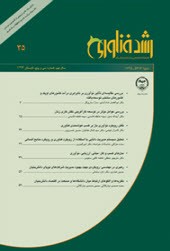بررسي مقايسه اي تأثير نوآوري بر نابرابري درآمد کشورهاي اوپک و کشورهاي منتخب توسعهيافته
محورهای موضوعی : نوآوري و خلاقيتابولفضل شاه آبادی 1 * , سارا ساری گل 2
1 - تربیت مدرس
2 - -
کلید واژه: نوآوري, نابرابري درآمد, کشورهاي اوپک, کشورهاي سازمان همکاري و توسعه اقتصادي.,
چکیده مقاله :
در دهههاي اخير کاهش نابرابري درآمد جزء اهداف عمده راهبرد توسعه اقتصادي و اجتماعي و حتي از وظايف مهم دولتها محسوب ميشود. از اينرو، توجه به نابرابري درآمد و تجزيه و تحليل آثار توزيعي سياستهاي اعمال شده بر آن براي افزايش رشد اقتصادي از اهميت ويژهاي برخوردار شده است. از طرفي ديگر امروزه توانايي دستيابي به نوآوريها با بهرهگيري از منابع انساني خلاق به عنوان نخستين گام براي تبديل دانش به ثروت شناخته شده است. لذا با توجه به اهميت کليدي نوآوري در اقتصادهاي نوين، پژوهش حاضر به بررسي تأثير نوآوري بر نابرابري درآمد کشورهاي OPEC و کشورهاي توسعهيافته منتخب OECD طي دوره زماني 2009-1995 ميپردازد. نتايج مطالعه حاکي از آن است که وضعيت کشورهاي OPEC در مقايسه با کشورهاي OECD در شاخصهاي جيني و نوآوري ضعيف و نامطلوب ميباشد که اين امر ناشي از فقدان هماهنگي سياستهاي کلان اقتصادي با سياستهاي علمي و پژوهشي است. همچنين بر اساس نتايج به دست آمده، اکثر کشورهايي که درحمايت از فعاليتهاي نوآورانه موفقتر عمل کردهاند داراي توزيع درآمد بهتري هستند. بنابراين کشورهاي مورد مطالعه در مسير حرکت از اقتصاد منابع و سرمايهمحور به سوي اقتصاد دانشمحور، حمايت از فعاليتهاي نوآورانه و کاهش نابرابري درآمد ضروري است جهتگيري سياستهاي کلان اقتصادي آنان هماهنگ با سياستهاي پژوهشي و آموزشي باشد.
In recent decades, the reduction of income inequality should be considered as the strategy of the major objectives of economic and social development and even the government. Therefore, analysis of income distribution and distributional effects of policies in order to increase economic growth has gained importance. On the other hand, the ability to achieve creative innovation using human resources as the first step is to convert knowledge into wealth. So, considering the critical importance of innovation in modern economies, the present study investigated the role of innovation on income inequality of OPEC countries and selected the OECD developed countries during the period 1995-2009. The results suggest that the status of OPEC countries compared to OECD countries in both the Gini index as well as innovation is weak and undesirable, due to the lack of coordination between macro-economic policies from one side and research and educational policies form other side. Also based on the results, most countries with better support for innovative activities have shown better income distribution. Thus, the movement of countries with economy and capital resources oriention towards knowledge-based economy, innovative activities support and reduce income inequality are essential orientations for macro-economic policies along with research and educational policies.

